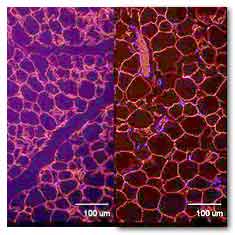|
Scientists at the University of British Columbia
have discovered a gene that could be an important
cause of obesity.
The gene, which encodes a protein called 14-3-3zeta,
is found in every cell of the body. But when
scientists silenced the gene in mice, it resulted in
a 50 per cent reduction in the amount of a specific
kind of unhealthy white fat. The fat reduction
occurred despite the mice consuming the same amount
of food.
Mice that were bred to have higher levels of the
14-3-3zeta protein were noticeably bigger and
rounder, having an average of 22 per cent more white
fat when fed a high calorie diet.

When scientists silenced the ‘obesity gene’ in mice, fat cells were 50 per cent smaller. (left vs. right)
Earlier this year, a consortium of scientists found
over 100 regions on the human genome that correlate
with obesity, likely through regulating the brain’s
perception of hunger and the distribution of fat
throughout the body.
That study, however, did not identify the gene that
encodes 14-3-3zeta, which controls the production of
fat cells (known as adipogenesis) and the growth of
those cells.
Discovery of this direct link between a protein and
fat production, described in Nature Communications,
points the way to a possible drug therapy.
Scientists theorize that by suppressing the gene or
blocking the protein, they could prevent fat
accumulation in people who are overweight, or are on
their way to becoming so.
“People gain fat in two ways: through the
multiplication of their fat cells, and through the
expansion of individual fat cells,” said Gareth Lim,
a postdoctoral fellow in UBC’s Life Sciences
Institute. “This protein affects both the number of
cells and how big they are, by playing a role in the
growth cycle of these cells.”
Lim and James Johnson, a professor of cellular and
physiological sciences, began investigating the
14-3-3 family of proteins four years ago as it often
shows up in the unhealthy fat tissue of obese
people. This study not only identified zeta as the
operative protein, but demonstrated a clear
cause-and-effect between 14-3-3zeta and fat
accumulation.
“Until now, we didn’t know how this gene affected
obesity,” Johnson said. “This study shows how
fundamental research can address major health
problems and open up new avenues for drug
discovery.”
For more information
14-3-3ζ coordinates adipogenesis of visceral fat
Gareth E. Lim, Tobias Albrecht, Micah Piske, Karnjit
Sarai, Jason T. C Lee, Hayley S. Ramshaw, Sunita
Sinha, Mark A. Guthridge, Amparo Acker-Palmer, Angel
F. Lopez, Susanne M. Clee, Corey Nislow & James D.
Johnson
Nature Communications 6 - Article number: 7671
doi:10.1038/ncomms8671
MDN |